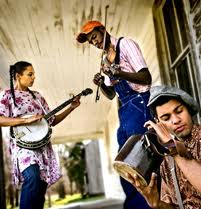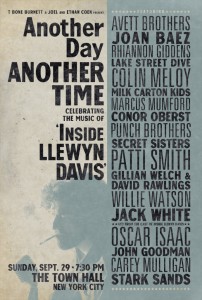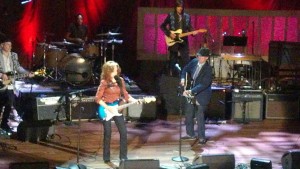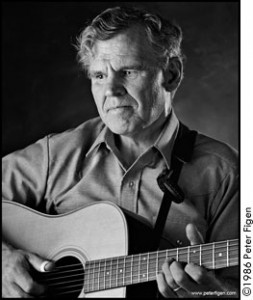
I’ve been kicking around the ideas to address Giovanni Russonello’s “Why Is a Music Genre Called ‘Americana’ So Overwhelmingly White and Male?” i heard my mom’s advice in m mind,
“just walk away from the stupid.” Part of it was my dad’s voice “Teach ’em a lesson.” i’ve decided to go with dad on this one.
Russonello’s piece frames the recent six-week “Americanarama” tour to argue that the tour’s roster, which included Bob Dylan, Wilco, My Morning Jacket and Ryan Bingham – represents a larger cultural exclusion rampant in the genre.
Setting aside the argument that the “Americanarama” bill does not really represent the contemporary Americana genres, let’s address the premise of “Overwhelmingly White and Male”
Early country, folk and bluegrass have generally appealed to a predominantly anglo audience. Partly because many of the songs are from European source material performed by mostly white people. The trend in these genres have mapped closely to the trends in American society in general and, as opportunities have arisen, woman and people of color have stepped up to represent their unique take on the music.
The difference is that Americana proper (and it’s cousin alt.country) have never been exclusionary.
It’s introduction into popular culture came in the 80’s as MTV gave us the L.A. cow punk band Lone Justice , featuring the gritty soul of Maria McKee, and their “Ways to be Wicked” and “Sheltered videos in rotation with Jason and the Scorchers and The Georgia Satellites on the 24- hour feed.
At the same time kd Lang and Roseanne Cash joined Steve Earle, Dwight Yoakam and Lyle Lovett in shaking up Nashville.
Soon after bands like The Meat Purveyoyers, Freakwater , Neko Case, Gillian Welch, the Cowboy Junkies, Hem, Tarnation – all bands prominently featuring female artists – laid the groundwork for Americana.
An allum of the watershed “O Brother where art thou” roster, Alison Krauss, has the enviable honor of having won the most Grammys by a female artist with twenty-seven (!)
Hardly the good-old boys club that article paints for the genre.
Then there’s this:
“… if an art form is going to name itself after this country, it should probably stop weatherproofing itself against America’s present-day developments. And it hardly seems like enough to say you’re carrying on the legacies of black gospel and blues if the performers and listeners venerating them are almost all white.”
The claim that Americana is “carrying on the legacies of black gospel and blues” is specious. True, some artist incorporate gospel and blues within their style, to say that Americana is carrying on the legacy of those sage musical genres is insulting to these thriving genres and their decades of practitioners.
And the argument that since the genre appeals to a particular segments of the population signifies that genre exclusion of others is ridiculous. Much of music is self-identity. If a segment of society don’t see themselves in the performers and their stories it follows that they wouldn’t be compelled to buy the music or attend the shows. Early hip-hop was a primarily African -American cultural phenomenon which has now transcended. As for as I know on one was accusing hip-hop of excluding anglos.
Just as people of color have taken different roads to Americana, and have contributed to it’s evolution. Los Lobos and Alejandro Escovedo bring a uniquely chicano take to the music. The Carolina Chocolate Drops and newcomer Valarie June have infused the genre with African-American string-band and folk-soul influences receptively.
Russonello places Dylan as the “the father of Americana” (I would argue Gram Parsons or Townes Van Zandt) and then points to the current shining light, Jason Isbell, as not heading the lessons of Dylan and providing anything “new.” The argument could be made that Dylan at the beginning of his career, as Isabell still is, brought nothing that hadn’t already been done by Guthrie and Seeger. Russonello then makes the case that “Music gets its power from a keen, contemporary perspective” and then “it feels facile to let this one strain of yellow-page nostalgia represent it.”
This is just lazy. Though the form, the music and singing styles harken back to a yesteryear , topics are either contemporary, like Isbell, Todd Snider and Steve Earle or dealing with the great human truths – love, hate, death – that transcend any time period.
Though the article does a serviceable job of tracing roots music’s trajectory thorough time, the conclusion shows a bias of the writer. Anything this white and male met be a conspiracy..
Americana does reflect an idealized notion of the the past (as Americans are prone to do,) but to confuse the predilections of subjective taste enjoyed by some as a kind of organized Jim Crow-style musical segregation insults a music and musicians that I celebrate daily. It also, ironically, displays a type of bigotry that all cultural forms must undergo some forced, artificial desegregation toward some imagined moral purity.
Let freedom twang!




